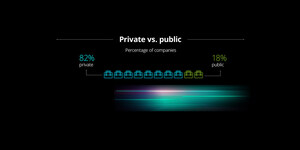WASHINGTON, Sept. 16, 2019 /PRNewswire/ -- The effective dates for compliance with the Federal Accounting Standards Advisory Board's (FASAB) and Governmental Accounting Standards Board's (GASB) respective lease accounting standards are drawing near. However, few professionals in U.S. government entities feel prepared to comply (11.4% of federal agency employees and 12.4% of state or local government or higher education institution employees), according to a new Deloitte online poll.
The GASB lease accounting standard (GASB 87) is currently effective for reporting periods starting after Dec. 15, 2019; however, GASB has issued an exposure draft proposing to amend the effective date from reporting periods starting after Dec. 15, 2019 to fiscal years starting after Dec. 15, 2019. The FASAB standard is effective for fiscal years starting after Sept. 30, 2020.
"It may feel like these organizations have time to comply, but the complexity of implementation shouldn't be ignored as some government entities will need to put thousands of real estate or equipment leased assets on their balance sheets," said Jennifer Ahn, Deloitte Risk & Financial Advisory partner, Deloitte & Touche LLP. "Even streamlined lease accounting implementation efforts by public companies took months, if not years—and many plan to keep working on improving their processes. Government organizations working on tight budgets and with limited workforce resources may need far longer to comply initially."
When asked about the expected effort involved in implementing the new lease accounting standards, 41.8% of federal agency employees and 40.7% of state or local government or higher education responding professionals described it as "difficult." Identifying leases and gathering data for lease accounting calculations posed the top challenge to organizations' compliance efforts in the year ahead, according to responses from both federal agency professionals (24.7%) and those working in state or local governments or higher education (39.9%).
Blake Rodgers, Audit & Assurance partner, Deloitte & Touche LLP, added, "We hear from government and higher education professionals that the challenges they're experiencing include a lot of the same pain points public companies contended within their own lease accounting implementation efforts. Ideally, some of the lessons learned by public companies can benefit those implementing for government entities."
Some of the lease accounting implementation lessons government entities can learn from public company leaders include:
- Allocate considerable time and resources to finding leases. "Our government professional respondents ranked the identification of leases and lease data as a top challenge for the year ahead, likely because those files and data points may be on hard copy only, dispersed across the entity or embedded within larger contracts," said Ahn. "Government finance and accounting professionals can learn from public companies by affording plenty of time to tackle this considerable undertaking."
- Don't expect information technology (IT) solutions to do everything. Identifying lease accounting software to assist with the implementation was tough for some public companies, but government entities today have more solutions from which to choose. Of course, any lease accounting software must be configured to an organization's unique needs and existing systems and should be tested regularly. "As with all software, lease accounting solutions are only as effective as the users working in the system, making training and change management important components of IT implementation efforts," continued Ahn. "But, don't let the IT challenges public companies encountered deter your organization from considering the use of software to track and maintain lease data. With so much more and deeper data needed for lease accounting calculations, finding a software solution to manage efforts long-term can be incredibly helpful."
- Don't underestimate the value of strong processes and controls. Managing necessary changes to business processes, controls, and employee/stakeholder communications was of more concern to responding federal employees (17.5%) than other government employees (7.6%). "For many public companies, processes and controls were developed late in the implementation process," said Rodgers. "Government entities can achieve efficiencies by designing and implementing lease accounting processes and controls early in the process—particularly in areas where management judgment is required, and to comply with enhanced disclosure requirements of the new lease accounting standards."
- Prepare to manage the organizational changes that arise from new standard implemenation. Sometimes far-reaching organizational changes are needed for implementing the new lease accounting standard, involving functions like IT, operations, procurement, accounting and finance, treasury, as well as financial planning and analysis. "While not all public companies thought to start with aligning groups that would be impacted by the lease accounting implementation, it's important for various internal and external groups to be aware of the changes needed for compliance with the new standards. Government entities can benefit from strong project management, including a clearly defined roadmap and effective communication, change management and training procedures," concluded Rodgers.
About the online poll
On June 20, 2019, a Deloitte Dbriefs webcast, titled "New lease accounting standards: Lessons learned from public companies" and involving the Deloitte Center for Controllership, polled more than 230 employees of federal, state or local governments and higher education institutions about lease accounting implementation. Answer rates differed by question.
About Deloitte
Deloitte provides industry-leading audit, consulting, tax and advisory services to many of the world's most admired brands, including nearly 90% of the Fortune 500® and more than 5,000 private and middle market companies. Our people work across the industry sectors that drive and shape today's marketplace — delivering measurable and lasting results that help reinforce public trust in our capital markets, inspire clients to see challenges as opportunities to transform and thrive, and help lead the way toward a stronger economy and a healthy society. Deloitte is proud to be part of the largest global professional services network serving our clients in the markets that are most important to them. Our network of member firms in more than 150 countries and territories serves four out of five Fortune Global 500® companies. Learn how Deloitte's approximately 286,000 people make an impact that matters at www.deloitte.com.
Contacts
Shelley Pfaendler |
Cheznee Johnson |
Public Relations Deloitte Services LP |
Public Relations Deloitte Services LP |
+1 212 492 4484 |
+1 919 546 8100 |
Deloitte refers to one or more of Deloitte Touche Tohmatsu Limited, a UK private company limited by guarantee ("DTTL"), its network of member firms, and their related entities. DTTL and each of its member firms are legally separate and independent entities. DTTL (also referred to as "Deloitte Global") does not provide services to clients. In the United States, Deloitte refers to one or more of the US member firms of DTTL, their related entities that operate using the "Deloitte" name in the United States and their respective affiliates. Certain services may not be available to attest clients under the rules and regulations of public accounting. Please see www.deloitte.com/about to learn more about our global network of member firms.
SOURCE Deloitte

Related Links
WANT YOUR COMPANY'S NEWS FEATURED ON PRNEWSWIRE.COM?
Newsrooms &
Influencers
Digital Media
Outlets
Journalists
Opted In





Share this article